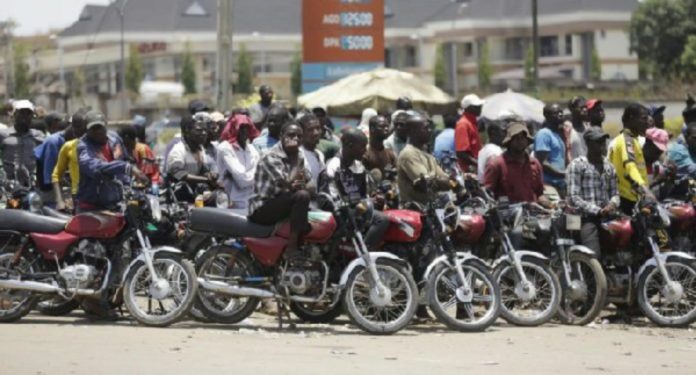Persons willing to operate a commercial motorcycle or tricycle, popularly known as ‘okada’, can only do so if they belong to a recognised tricycle transport union or are employed by a licensed commercial motorcycle company.
This provision, which prohibits operations without membership in a recognised union and sets the minimum age for riders at 25, is part of a new Legislative Instrument (LI) being drafted to amend the existing Road Traffic Regulations, 2012 (Legislative Instrument 2180).
Speaking at a national stakeholder consultation in Accra on Monday on the draft LI 2180, the Minister of Transport, Joseph Bukari Nikpe, said the government was introducing a new licensing regime to enhance the monitoring of commercial motorcycles and tricycles and ensure that operators meet the necessary competency standards.
“Our utmost priority is the safety and welfare of the riders and passengers. Therefore, some provisions in the regulations will cover the mandatory use of helmets, periodic inspections and rider training,” Mr Nikpe said at the meeting, which was the first in a series of nationwide consultations to review LI 2180 and pave the way for the official operationalisation of okada, a thriving business among the youth.
The consultative meeting brought together representatives from the Motor Traffic and Transport Department (MTTD) of the Ghana Police Service, the Ghana Private Road Transport Union (GPRTU), the association of okada riders, heads of relevant agencies and departments, industry practitioners, civil society organisations and transport operators.
Proposed provisions
“A person shall not ride or operate a commercial motorcycle or tricycle unless that person is employed by or belongs to a licensed commercial motorcycle or tricycle transport union,” the proposed regulations state.
Anyone who flouts this provision, once it becomes law, by operating “a motorcycle or tricycle for fare-paying passenger services in contravention of sub-regulation (1) commits an offence and is liable to pay a fine of 100 penalty units or face a term of imprisonment or both”.
Background
Motorcycles and tricycles have become a crucial part of Ghana’s transport ecosystem over the past decade. They are especially useful for last-mile journeys and in areas where traditional para-transit vehicles (trotros) and taxis find it difficult to operate.
In some urban centres, particularly in the northern part of the country, motorcycles and tricycles have virtually replaced traditional public transport vehicles.
However, as their popularity has surged, so have the challenges associated with their use. The Transport Minister noted that there has been a sharp increase in road traffic crashes and fatalities involving these vehicles. He also cited concerns over safety regulations, disregard for traffic laws, and the need for a structured governance system for the sector.
Committee
Since the 2016 electioneering period, former President John Dramani Mahama pledged to implement effective regulations for the commercial use of motorcycles and tricycles to improve safety, job security, and rider welfare.
Last month, the Minister of Transport constituted a 13-member committee made up of representatives from the Office of the Attorney General and Ministry of Justice, Ministry of Youth Development and Empowerment, Ministry of Local Government, Chieftaincy and Religious Affairs, Driver and Vehicle Licensing Authority (DVLA), and the National Road Safety Authority. The committee is chaired by the Ministry of Transport.
The committee was tasked with developing a draft regulatory framework for the use of motorcycles and tricycles for fare-paying passenger services, with a focus on safety, inclusivity, and innovation.
Following several engagements, the committee developed a draft framework which was presented to stakeholders at Monday’s meeting.
Purpose
Mr Nikpe said the stakeholder consultation aimed to gather grassroots input to refine the regulations under development. He urged participants to discuss the issues dispassionately and recommend practical measures for adoption and implementation.
“Through this dialogue, we hope to develop a comprehensive and robust regulatory framework that will stand the test of time for the consideration of Parliament,” he stated.
Other provisions
The draft regulatory framework proposes that a person is qualified to engage in commercial motorcycle or tricycle operations only if registered under the Companies Act, 2019 (Act 992) as a limited liability company, partnership, union, society, cooperative, or similar association.
The Head of Road Transport Services at the Ministry of Transport, Daniel Essel, who presented the framework, explained that an operator must have a physical presence in at least eight administrative regions and maintain a minimum fleet of 50 in each region—or as determined by the regulatory authority in consultation with the Minister of Transport.
Operators must also adopt a standard dress code approved by the regulatory authority and meet other conditions prescribed by the DVLA and district assemblies.
Riders must obtain and renew a licence every two years, while commercial motorcycle or tricycle unions must renew their licences annually and comply with a code of conduct approved by the Minister.
Unions are also required to organise annual re-training or refresher courses for their riders in consultation with the regulatory authority, and all registered members must be enrolled on an electronic database.
District assemblies
The regulation empowers district assemblies to issue permits for commercial motorcycle or tricycle unions to operate in their jurisdictions, subject to the payment of a prescribed fee and fulfilment of specific conditions.
Assemblies are expected to designate or approve terminals and stands in their localities.
Mr Essel said that unions must promptly investigate and maintain records of any violations of the code of conduct, with penalties applicable for breaches.
Riders
To qualify as a commercial rider, applicants must:
Be at least 25 years old
Possess a valid National Identification Card
Pass a commercial motorcycle/tricycle proficiency test, oral and theoretical tests, and an eye test
Complete training based on the approved syllabus and manual
Upon qualification, riders will be assigned a distinctive yellow licence plate with black lettering. They must wear a certified helmet with a unique number at the back and provide a certified helmet for pillion riders. Riders are also required to comply with all traffic laws and speed limits.
ALSO READ:

